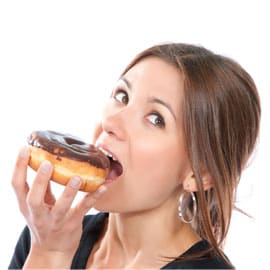
How to Identify if You Are Emotionally Eating
It may seem like an easy problem to identify, but emotional eating can be a conscious or subconscious choice. Some tell-tale signs may include:
- Eating when you’re not hungry. In the months after surgery, you may have returned to a more regular diet. However, after surgery you may find that your hunger cues have changed—you may not feel hungry at all. Employing a stricter schedule or routine for eating to maintain adequate nutrient levels may be necessary. Eating outside of this schedule could lead to dangerous food practices. Remember that your body is different now. Think about the last time you ate and determine whether you truly need to eat again.
- Changing your eating habits based on your level of stress. You may be experiencing a higher level of stress or anxiety due to your recent weight loss surgery. To cope with arising issues, you may find yourself snacking more throughout the average day. It may not seem like much extra, but snacking can lead to binging on foods that are higher in fat and calories. This can negatively affect your postoperative weight loss goals.
- Using food as an incentive or a positive reward. A bowl of ice cream or your favorite candy bar may seem nice after a particularly rough day at work. However, rewarding yourself with extra and unnecessary food is just another excuse to overeat.
- Identify your triggers. Do you turn to food when you are bored, anxious, or overwhelmed?
- Keep a food journal. If you record what you are eating, it is easy to track and maintain your postoperative diet. Write down what you were feeling when you ate. If you begin to notice that you are eating for reasons other than hunger, you can take the proper steps to change those habits.
- Find emotional support groups. It’s all right to feel anxious or overwhelmed following bariatric surgery. Just remember, you’re not alone. Finding a support group will provide you with an outlet to express and cope with your current concerns before you turn to your favorite “comfort foods.”
How to Avoid Emotional Eating After Weight Loss Surgery
Emotional eating is an easy solution to a temporary problem. Finding healthy ways to cope with the everyday burdens of your postoperative lifestyle is imperative. The results of your weight loss surgery may be dramatic; however, permanent lifestyle changes are necessary to maintain your new body. Don’t feel discouraged, and remember that there are many comforts and consolations to enhance your new lifestyle that don’t include food.

